09届高三英语第一次联考月考试卷
- 格式:doc
- 大小:113.00 KB
- 文档页数:5
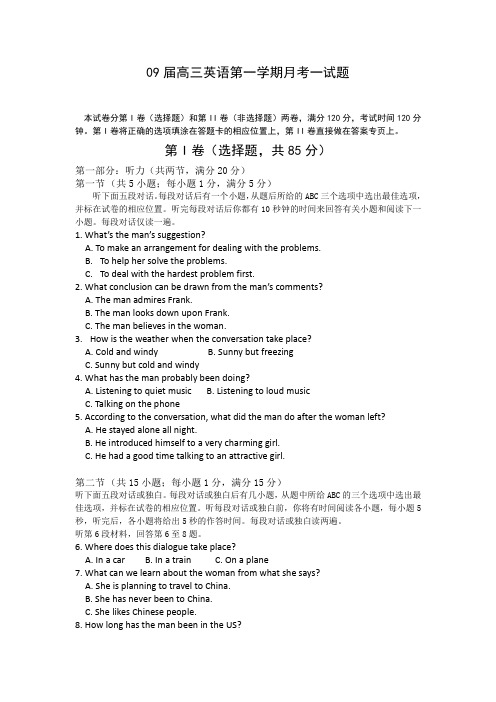
09届高三英语第一学期月考一试题本试卷分第I卷(选择题)和第II卷(非选择题)两卷,满分120分,考试时间120分钟。
第I卷将正确的选项填涂在答题卡的相应位置上,第II卷直接做在答案专页上。
第I卷(选择题,共85分)第一部分:听力(共两节,满分20分)第一节(共5小题;每小题1分,满分5分)听下面五段对话。
每段对话后有一个小题,从题后所给的ABC三个选项中选出最佳选项,并标在试卷的相应位置。
听完每段对话后你都有10秒钟的时间来回答有关小题和阅读下一小题。
每段对话仅读一遍。
1. What’s the man’s suggestion?A. To make an arrangement for dealing with the problems.B.To help her solve the problems.C.To deal with the hardest problem first.2. What conclusion can be drawn from the man’s comments?A. The man admires Frank.B. The man looks down upon Frank.C. The man believes in the woman.3.How is the weather when the conversation take place?A. Cold and windyB. Sunny but freezingC. Sunny but cold and windy4. What has the man probably been doing?A. Listening to quiet musicB. Listening to loud musicC. Talking on the phone5. According to the conversation, what did the man do after the woman left?A. He stayed alone all night.B. He introduced himself to a very charming girl.C. He had a good time talking to an attractive girl.第二节(共15小题;每小题1分,满分15分)听下面五段对话或独白。

09届高三级英语第一次月考试题卷英语科试卷I. 听力(共两节,满分35分)第一节听力理解(5段共15小题;每小题2分,满分30分)每段播放两遍。
各段后有几个小题,各段播放前每小题有5秒钟的阅题时间。
请根据各段播放内容及其相关小题,在5秒钟内从题中所给的A、B、C项中,选出最佳选项,并在答题卡上将该项涂黑。
听第一段对话,回答第1—3题。
1. What’s the most probable relationship between the two speakers?A. Seller and customer.B. Manager and secretary.C. Headmaster and teacher.2. How many mistakes has Rose made?A. Four.B. Three.C. Two.3. What can we know from the conversation?A. Rose was careless when typing this letter.B. Rose retyped the letter.C. Rose’s company lost the order because of Rose..听第二段对话,回答第4—6题。
4. Whom are the two speakers talking about?A. Mrs. Smith.B. Mr. Down.C. Jack.5. According to the conversation, what makes a difference in school for a student?A. Whether he/she likes the teachers.B. Whether he/she works hard.C. Whether he/she does homework until late.6. How does Jack usually go to school?A. By bus.B. On foot.C. By car听第三段对话,回答第7—9题。
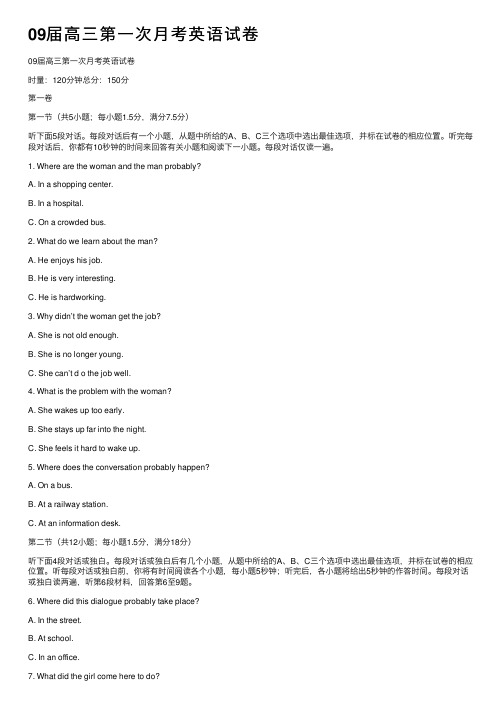
09届⾼三第⼀次⽉考英语试卷09届⾼三第⼀次⽉考英语试卷时量:120分钟总分:150分第⼀卷第⼀节(共5⼩题;每⼩题1.5分,满分7.5分)听下⾯5段对话。
每段对话后有⼀个⼩题,从题中所给的A、B、C三个选项中选出最佳选项,并标在试卷的相应位置。
听完每段对话后,你都有10秒钟的时间来回答有关⼩题和阅读下⼀⼩题。
每段对话仅读⼀遍。
1. Where are the woman and the man probably?A. In a shopping center.B. In a hospital.C. On a crowded bus.2. What do we learn about the man?A. He enjoys his job.B. He is very interesting.C. He is hardworking.3. Why didn’t the woman get the job?A. She is not old enough.B. She is no longer young.C. She can’t d o the job well.4. What is the problem with the woman?A. She wakes up too early.B. She stays up far into the night.C. She feels it hard to wake up.5. Where does the conversation probably happen?A. On a bus.B. At a railway station.C. At an information desk.第⼆节(共12⼩题;每⼩题1.5分,满分18分)听下⾯4段对话或独⽩。
每段对话或独⽩后有⼏个⼩题,从题中所给的A、B、C三个选项中选出最佳选项,并标在试卷的相应位置。

09届高三英语第一次月考检测试题2008.09(本卷满分150分,考试时间为120分钟)第I卷(三部分,共105分)第一部分:听力(20分)第一节(共5小题;每小题1分,满分5分)听下面5段对话。
每段对话后有一个小题,从题中所给的A、B、C三个选项中选出最佳选项,并标在试卷的相应位置。
听完每段对话后,你都有10秒钟的时间来回答有关小题和阅读下一小题。
每段对话仅读一遍。
1.At what time did Mary leave?A.Five o'clock.B.Ten to five.C.Ten o’clock.2.Who is the man talking to?A.A house painter.B.A mailman. C.A carpenter.3.What does the man suggest?A.It is polite to write back.B.Send her aunt a present to show her apology.C.Keep in touch with her aunt through Internet.4.Where will the family probably go for their holidays?A.Beijing. B.Guangzhou.C.Seaside.5.What happened to steam trains?A.They have been replaced by electric trains.B.They have been used for special railway service.C.They have become more comfortable.第二节(共15小题;每小题1分,满分15分)听下面5段对话或独白。
每段对话或独白后有几个小题,从题中所给的A、B、C三个选项中选出最佳选项,并标在试卷的相应位置。
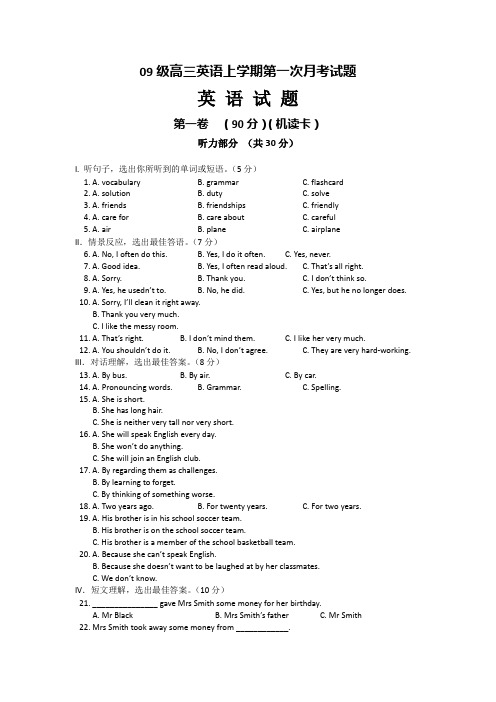
09级高三英语上学期第一次月考试题英语试题第一卷(90分)(机读卡)听力部分(共30分)I. 听句子,选出你所听到的单词或短语。
(5分)1. A. vocabulary B. grammar C. flashcard2. A. solution B. duty C. solve3. A. friends B. friendships C. friendly4. A. care for B. care about C. careful5. A. air B. plane C. airplaneII.情景反应,选出最佳答语。
(7分)6. A. No, I often do this. B. Yes, I do it often. C. Yes, never.7. A. Good idea. B. Yes, I often read aloud. C. That’s all right.8. A. Sorry. B. Thank you. C. I don’t think so.9. A. Yes, he usedn’t to. B. No, he did. C. Yes, but he no longer does.10. A. Sorry, I’ll clean it right away.B. Thank you very much.C. I like the messy room.11. A. That’s right. B. I don’t mind them. C. I like her very much.12. A. You shouldn’t do it. B. No, I don’t agree. C. They are very hard-working. III.对话理解,选出最佳答案。
(8分)13. A. By bus. B. By air. C. By car.14. A. Pronouncing words. B. Grammar. C. Spelling.15. A. She is short.B. She has long hair.C. She is neither very tall nor very short.16. A. She will speak English every day.B. She won’t do anything.C. She will join an English club.17. A. By regarding them as challenges.B. By learning to forget.C. By thinking of something worse.18. A. Two years ago. B. For twenty years. C. For two years.19. A. His brother is in his school soccer team.B. His brother is on the school soccer team.C. His brother is a member of the school basketball team.20. A. Because she can’t speak English.B. Because she doesn’t want to be laughed at by her classmates.C. We don’t know.IV.短文理解,选出最佳答案。
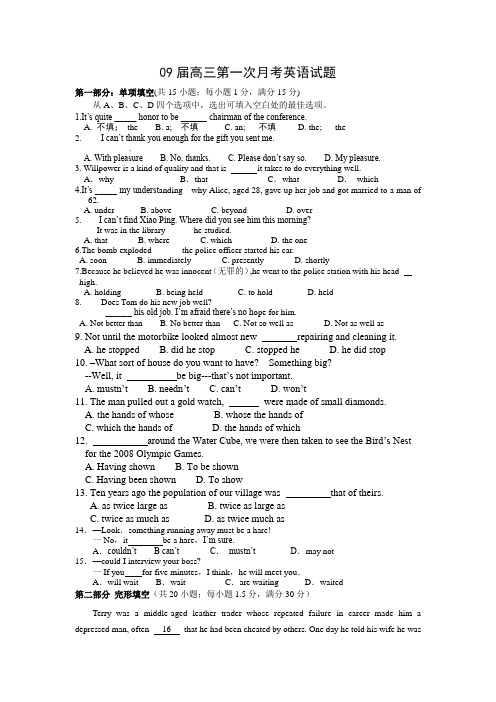
09届高三第一次月考英语试题第一部分:单项填空(共15小题;每小题1分,满分15分)从A、B、C、D四个选项中,选出可填入空白处的最佳选项。
1.It’s quite _____ honor to be ______ chairman of the conference.A. 不填;theB. a; 不填C. an; 不填D. the; the2.------ I can’t thank you enough for the gift you sent me.------ _______.A. With pleasureB. No, thanks.C. Please don’t say so.D. My pleasure.3. Willpower is a kind of quality and that is it takes to do everything well.A.why B.that C.what D.which4.It’s _____ my underst anding why Alice, aged 28, gave up her job and got married to a man of62.A. underB. aboveC. beyondD. over5.------I can’t find Xiao Ping. Where did you see him this morning?------It was in the library______ he studied.A. thatB. whereC. whichD. the one6.The bomb exploded ______ the police officer started his car.A. soonB. immediatelyC. presentlyD. shortly7.Because he believed he was innocent(无罪的),he went to the police station with his head_____ high.A. holdingB. being heldC. to holdD. held8. ------Does Tom do his new job well?------______ his old job. I’m afraid there’s no h ope for him.A. Not better thanB. No better thanC. Not so well asD. Not as well as9. Not until the motorbike looked almost new repairing and cleaning it.A. he stoppedB. did he stopC. stopped heD. he did stop10. –What sort of house do you want to have? Something big?--Well, it be big---that’s not important.A. mustn’tB. needn’tC. can’tD. won’t11. The man pulled out a gold watch, were made of small diamonds.A. the hands of whoseB. whose the hands ofC. which the hands ofD. the hands of which12. around the Water Cube, we were then taken to see the Bird’s Nest for the 2008 Olympic Games.A. Having shownB. To be shownC. Having been shownD. To show13. Ten years ago the population of our village was that of theirs.A. as twice large asB. twice as large asC. twice as much asD. as twice much as14.—Look.something running away must be a hare!一No,it be a hare,I’m sure.A.couldn’t B can’t C.mustn’t D.may not15.—could I interview your boss?一If you for five minutes,I think,he will meet you.A.will wait B.wait C.are waiting D.waited第二部分完形填空(共20小题;每小题1.5分,满分30分)Terry was a middle-aged leather trader whose repeated failure in career made him a depressed man, often 16 that he had been cheated by others. One day he told his wife he wasso 17 with the city that he had to leave.So his family moved to another city. It was the evening of a weekend. When Terry and his wife were busily 18 up their new home, the light suddenly 19 . Terry was regretful to have forgotten bringing along 20 and had to wait 21 in a low mood. Just then he heard light, hesitant 22 on his door that were clearly audible (听到) in the 23 night.“Who’s it?” he wondered, since Terry was a 24 to this city. And this was the moment he especially hated to be 25 , so he went to the door and opened it 26 . At the door was a little girl, shyly asking, “Sir, do you have candles? I’m your neighbor.” “No,” answered Terry in anger and shut the door 27 . “What a nuisance(讨厌)!” he complained over it with his wife. “No sooner had we settled down than the neighbor came to 28 things.”After a while, the door was knocked again. He opened it and found the same girl outside.29 this time she was 30 two candles, saying, “My grandma told me the new neighbor downstairs might need candles. She 31 me here to give you these.” Terry was very 32 by what he saw.At that moment he suddenly realized what caused his 33 in life. It was his 34 and harshness (刻薄) with other people. The person who had cheated him in life was 35 nobody else but himself, for his eyes had been blurred (蒙蔽) by his unsympathetic mind.16. A. complaining B. reflecting C. praying D. pretending17. A.inspired B. disappointed C. thrilled D. encouraged18.A. looking B. turning C. coming D. tidying19.A. went on B. went down C. went out D. went through20.A. candles B. matches C. lights D. flashlights21.A. happily B. patiently C. hopefully D. helplessly22.A. steps B. words C. knocks D. screams23.A. dark B. quiet C. noisy D. crowded24.A. newcomer B. stranger C. guest D. settler25.A. called B. disturbed C. watched D. offered26.A. surprisedly B. delightedly C. impatiently D. willingly27.A. gently B. kindly C. politely D. violently28.A. lend B. sell C. purchase D. borrow29.A. And B. But C. So D. For30.A. holding B. hiding C. fetching D. seeking31.A. suggested B. forbade C. sent D. forced32.A. frightened B. pleased C. excited D. surprised33.A. failure B. success C. complaint D. determination34.A. warmth B. coldness C. kindness D. sympathy35.A. doubtfully B. hardly C. really D. probly第三部分:阅读理解第一节(共20小题;每小题2分,满分40分)阅读下面短文,掌握其大意,然后从36-50的四个选项(A、B、C和D)中,选出最佳选项AAnother small animal that tigers eat in Ranthambhore ( a wildlife park in northern India ) is the porcupine. There animals are spread widely across India in open areas and grsassland; they often live in the earth and between rocks. They are good diggers, and in Ranthambhore are nocurnal; they only come out only at night. They weigh 12 to 16 kilograms and can reach lenghs of 80 t0 90 centimeters. They live usually on vegetables and fruits and seem to have a good sense of smell. Porcupines defend themselves when attacked by moving backwards with their quill upright, often making a strange noise.Several times, I have found the remains of quills where a tiger has killed and eaten a porcupine, but I have never actually seen the kill. In spite of the quills, experienced tigers will try to kill cleanly by biting the porcupine’s head, its weakest spot. But the quills are very sharp and can give painful injuries to young tigers.If the quills have gone in very deep or if they are stuck in the tiger’s paw, it will try to pull them out. Often, it will be successful, and the wound will get better, But, if the quills have gone very deep or if they are stuck in the tiger’s neck or mouth, where they cannot be reached, the wound will often turn bad. If this happens, the tiger is in pain and is less able to hunt animals. It has to look for easier food and so may turn to cows on the edges of the forest. From this, it is a small step to becoming a man-eater.36. A porcupine is a small animal which_________________.A. likes to fight against tigersB. is a kind of good food for tigersC. prefers to stay on vegetables and fruit rather than anywhere elseD. has vegetables and fruit as its main food37. The word ‘quills’ means __________.A. long, sharp needle-like parts on a porcupineB. feathers on a porcupineC. teeth of a porcupineD. feet of aporcupine38. What causes a tiger to become a man-eater according to this passage?A. When there are no porcupines for a tiger to catchB. When a tiger isn’t hurt seriously.C. When it is difficult for a tiger to catch other animals.D. When it turns to cows on the edges of the forest.39. What is the proper title for this passage?A. A porcupineB. How a Tiger kills a Porcupine?C. What Can Cause a Tiger to Become a Man-eater?D. A Tiger and its FoodB.This is a time of year when we think about giving and receiving presents. Can you find a little extra to give? On this page we suggest a few organizations you might like to help.Littleton Children’s HomeWe DON’T want your money, but children’s toys, books and clothes IN GOOD CONDITION would be very welcome.Also, we are looking for friendly families who would take our children into their homes for a few hours or days as guests. You have so much ---will you share it?Phone Sister Thomas on 3455678.Children’s HospiceWe look after a small number of very sick children. This important work needs skill love. We cannot continue without gifts or money to pay for more nursing staff. We also need storybooks and toys suitable for quiet games.Please contact the Secretary, Little Childr en’s Hospice, Newby Road.Street FoodIn the winter weather, it’s no fun being homeless. It’s even worse if you’re hungry. We give hot food to at least fifty people every night. It’s hard work, but necessary. Can you come and help? If not, can you find a little money? We used a very old kitchen, and we need some new saucepans. Money for new ones would be most welcome indeed.Contact Street Food, c/o Mary’s House, Elming Way. Littleton Phone 2854713.Littleton Youth ClubHave you got an unwanted chair? ------a record-player?-----a pot of paint?Because we can use them!We want to get to work on our meeting room!Please phone 7765231 and we’ll be happy to collect anything you can give us. Thank you!The Night ShelterWe offer a warm bed for the night to anyone who has nowhere to go. We rent the former Commercial Hotel on Green Street. Although it is not expensive, we never seem to have quite enough money. Can you let us have a few pounds? Any amount, however small, will be such a help.Send it to us at 15, Green St., Littleton. Please make check payable to Night Shelter.40. Reading the passage, you might like to help these organizations which are working for______.A. homeless and sick childrenB. less fortunate members of our societyC. hungry people who are homelessD. friendly members of our society to help others41. If you like children and you could offer a happy family to a homeless child, you may go to __.A. Street FoodB. Night ShelterC. Children’s HomeD. Children’s Hospice42. We can infer that ________________.A .there are too many social problems in this country.B. people are poor during the time for giving and receiving presentsC. warm-hearted people like to give away moneyD. this passage is taken from a local newspaper.CIt was a bleak(阴冷的),rainy day, and I drove there,tired and unwilling to go anywhere else.But my daughter had insisted that I come see something at the top of the mountain.Turning down a narrow track,we parked the car and got out.We walked along a path that was thick with old pine needles.Huge black-green overgreens(常青树) towered over.Gradually the peace and silence of the place began to fill my mind.Then we turned a corner--and I stopped and gasped in amazement.From the top of the mountain,sloping for several acres(英亩)across fields and valleys were rivers of daffodils in radiant bloom(盛开).Plenty of colors---from the palest ivory to the deepest lemon to the most vivid salmon(浅橙色)—blazed like a carpet before us.It looked as though the sun had tipped over and spilled gold down the mountainside.A riot(抑制不住)of questions filled my mind.Who created such beauty? Why? How?As we approached the home that stood in the center of the property, We saw a sign:ANSWERS TO THE QUESTIONS I KNOW YOUAREASKING.The first,answer was:ONE WOMAN -TWO HANDS,TWO FEET AND VERY LITTLE BRAIN。
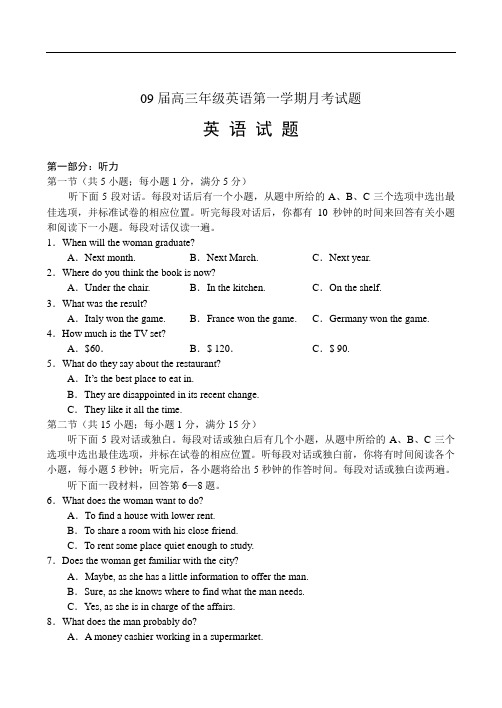
09届高三年级英语第一学期月考试题英语试题第一部分:听力第一节(共5小题;每小题1分,满分5分)听下面5段对话。
每段对话后有一个小题,从题中所给的A、B、C三个选项中选出最佳选项,并标准试卷的相应位置。
听完每段对话后,你都有10秒钟的时间来回答有关小题和阅读下一小题。
每段对话仅读一遍。
1.When will the woman graduate?A.Next month. B.Next March. C.Next year.2.Where do you think the book is now?A.Under the chair. B.In the kitchen. C.On the shelf.3.What was the result?A.Italy won the game. B.France won the game. C.Germany won the game. 4.How much is the TV set?A.$60.B.$ 120.C.$ 90.5.What do they say about the restaurant?A.It’s the best place to eat in.B.They are disappointed in its recent change.C.They like it all the time.第二节(共15小题;每小题1分,满分15分)听下面5段对话或独白。
每段对话或独白后有几个小题,从题中所给的A、B、C三个选项中选出最佳选项,并标在试卷的相应位置。
听每段对话或独白前,你将有时间阅读各个小题,每小题5秒钟;听完后,各小题将给出5秒钟的作答时间。
每段对话或独白读两遍。
听下面一段材料,回答第6—8题。
6.What does the woman want to do?A.To find a house with lower rent.B.To share a room with his close friend.C.To rent some place quiet enough to study.7.Does the woman get familiar with the city?A.Maybe, as she has a little information to offer the man.B.Sure, as she knows where to find what the man needs.C.Yes, as she is in charge of the affairs.8.What does the man probably do?A.A money cashier working in a supermarket.B.A student studying in a college.C.A manager arranging part time jobs.听下面一段材料,回答第9—11题。
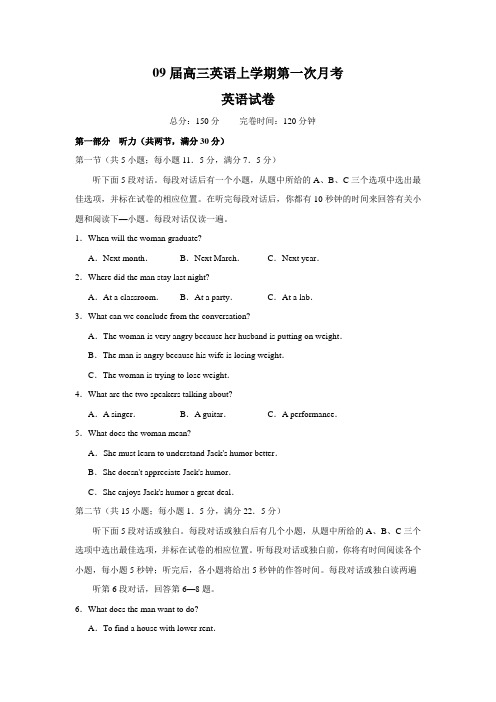
09届高三英语上学期第一次月考英语试卷总分:150分完卷时间:120分钟第一部分听力(共两节,满分30分)第一节(共5小题;每小题11.5分,满分7.5分)听下面5段对话。
每段对话后有一个小题,从题中所给的A、B、C三个选项中选出最佳选项,并标在试卷的相应位置。
在听完每段对话后,你都有10秒钟的时间来回答有关小题和阅读下—小题。
每段对话仅读一遍。
1.When will the woman graduate?A.Next month.B.Next March.C.Next year.2.Where did the man stay last night?A.At a classroom.B.At a party.C.At a lab.3.What can we conclude from the conversation?A.The woman is very angry because her husband is putting on weight.B.The man is angry because his wife is losing weight.C.The woman is trying to lose weight.4.What are the two speakers talking about?A.A singer.B.A guitar.C.A performance.5.What does the woman mean?A.She must learn to understand Jack's humor better.B.She doesn't appreciate Jack's humor.C.She enjoys Jack's humor a great deal.第二节(共15小题;每小题1.5分,满分22.5分)听下面5段对话或独白。
每段对话或独白后有几个小题,从题中所给的A、B、C三个选项中选出最佳选项,并标在试卷的相应位置。
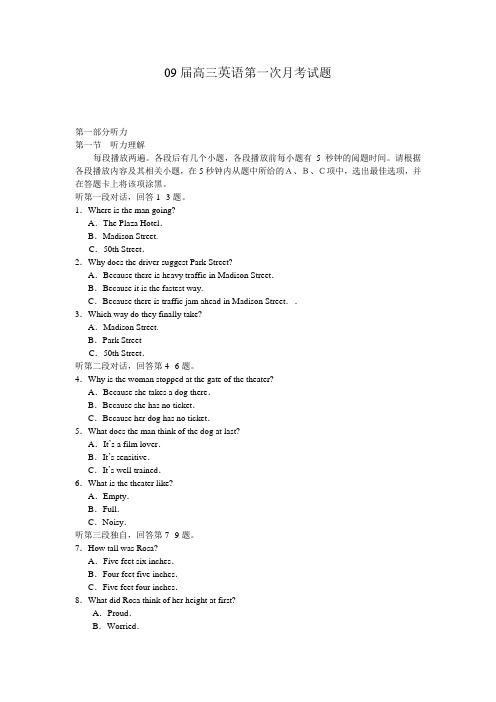
09届高三英语第一次月考试题第一部分听力第一节听力理解每段播放两遍。
各段后有几个小题,各段播放前每小题有5秒钟的阅题时间。
请根据各段播放内容及其相关小题,在5秒钟内从题中所给的A、B、C项中,选出最佳选项,并在答题卡上将该项涂黑。
听第一段对话,回答1--3题。
1.Where is the man going?A.The Plaza Hotel.B.Madison Street.C.50th Street.2.Why does the driver suggest Park Street?A.Because there is heavy traffic in Madison Street.B.Because it is the fastest way.C.Because there is traffic jam ahead in Madison Street..3.Which way do they finally take?A.Madison Street.B.Park StreetC.50th Street.听第二段对话,回答第4--6题。
4.Why is the woman stopped at the gate of the theater?A.Because she takes a dog there.B.Because she has no ticket.C.Because her dog has no ticket.5.What does the man think of the dog at last?A.It’s a film lover.B.It’s sensitive.C.It’s well trained.6.What is the theater like?A.Empty.B.Full.C.Noisy.听第三段独自,回答第7--9题。
7.How tall was Rosa?A.Five feet six inches.B.Four feet five inches.C.Five feet four inches.8.What did Rosa think of her height at first?A.Proud.B.Worried.C.Not care.9.What can be learned from the passage?A.Rosa’s mother was worried about Rosa’s height.B.Mr.Ransom was Rosa’s coach.C.Rosa was good at football.听第四段对话,回答第10---12题。

09届高三英语第一学期第一次月考试题(本试卷满分120分,考试时间120分钟)第一部分听力(共两节,满分20分)做题时,先将答案标在试卷上。
录音内容结束后,你将有两分钟的时间将试卷上的答案转涂到答题卡。
第一节(共5小题;每小题1分,满分5分)听下面5段对话。
每段对话后有一个小题,从题中所给的A、B、C三个选项中选出最佳选项,并标在试卷的相应位置。
听完每段对话后,你都有10秒钟的时间来回答有关小题和阅读下一小题。
每段对话仅读一遍。
1. When is Jhone supposed to arrive ?A. 7:30 a.mB.At 8:00 a.mC.At 8:15 a.m2. What does the woman suggest?A. getting help from AAA.B. Having a ride with herC. Changing3. Where are the speakers?A. At a restaurant.B.On a plane. C .At a waiting room4. What are speakers mainly about ?A. A hobby B . A plan C. Music5. Where does the man plan to go?A. To the libraryB.To a bookshopC.To the Sciene Buiding第二节(共15 小题;每小题1分,满分15分)听下面5段对话或独白。
每段对话或独白后有几个小题,从题中所给的A、B、C三个选项中选出最佳选项,并标在试卷的相应位置。
听完每段对话或独白前后,你将有时间阅读各个小题,每小题5秒钟;听完后,各小题将给出5秒钟的作答时间。
每段对话或独白读两遍。
请听第6段材料,回答第6至第7小题6. What does the man do ?A. He works in a famous hotel.B. He is a building designer.C. He is a teacher7. What might be a problem for the man?A. He has diffent opinions from his collegueB. He can’t do whatever he wants .C. He has trouble with his work请听第7段材料,回答第8至第10题8. Where did the woman go last night?A. A cinemaB. Rudolph’s placeC. An Italian restaurant9. What does the woman say about the atmosphere ?A. WonderfulB. AwfulC. A date10.What are the speakers mainly talking about ?A. A hobbyB. A planC. A date请听第8段材料,回答第11至13题11.When did the man say he arrived at Albert’s place ?A. At 11 p.mB. At about 12 at nightC. At 12:25a.m12.Where did man say he found Albert?A. In the swimming poorB. In the dinining roomC. At the door13.Who most probably is the woman ?A. A teacheerB. A reporterC.A policewoman请听第9段材料,回答第14至16题14.who is on an apple diet?A. The man’s sisterB. The man’s friendC. The man’s cousin15.What does the woman say about egg diet ?A. It does good to healthB. It does’nt help lose weightC. It does harm to heart16.what does the woman think of steak diet?A. It’s expensiveB. It does harm to teethC. It’s bad for heart请听第10段材料,回答第17至20题17. What does the speaker mainly talk about ?A. An experimentB. A workbookC. Equipment18. who is the speaker?A. A teacherB. A librarianC. A tour guide19. How are the activities different from experiment ?A. The activities take less timeB. No equipment is needed in activitiesC. Fewer instructions are given for activities20. When is the talk given ?A. At the biginning of the semesterB. After the first experimentC. At the end of the class第二部分:英语语言知识运用(共三节,满分35分)第一节:单项选择(共15 小题;每小题1分,满分15分)请认真阅读下面各题,从题中所给的A、B、C、D四个选项中,选出可以填入空白处的最佳选项,并在答题卡上将该项涂黑。
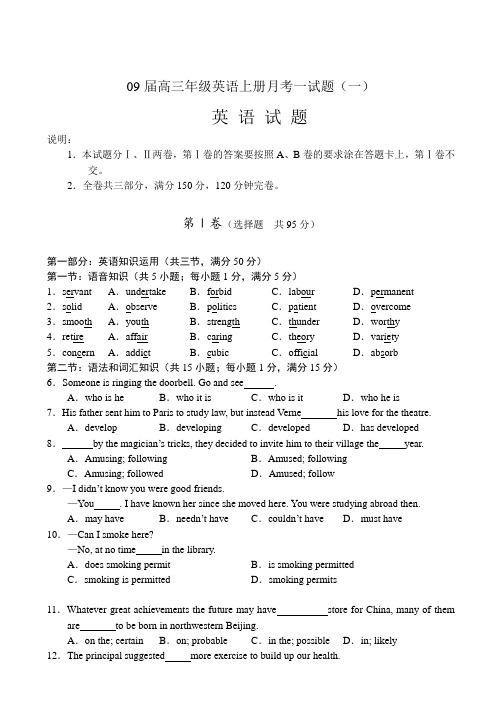
09届高三年级英语上册月考一试题(一)英语试题说明:1.本试题分Ⅰ、Ⅱ两卷,第Ⅰ卷的答案要按照A、B卷的要求涂在答题卡上,第Ⅰ卷不交。
2.全卷共三部分,满分150分,120分钟完卷。
第Ⅰ卷(选择题共95分)第一部分:英语知识运用(共三节,满分50分)第一节:语音知识(共5小题;每小题1分,满分5分)1.servant A.undertake B.forbid C.labour D.permanent 2.solid A.observe B.politics C.patient D.overcome 3.smooth A.youth B.strength C.thunder D.worthy4.retire A.affair B.caring C.theory D.variety 5.concern A.addict B.cubic C.official D.absorb第二节:语法和词汇知识(共15小题;每小题1分,满分15分)6.Someone is ringing the doorbell. Go and see .A.who is he B.who it is C.who is it D.who he is7.His father sent him to Paris to study law, but instead Verne his love for the theatre.A.develop B.developing C.developed D.has developed8.by the magician’s tricks, they decided to invite him to their village the year.A.Amusing; following B.Amused; followingC.Amusing; followed D.Amused; follow9.—I didn’t know you were good friends.—You . I have known her since she moved here. You were studying abroad then.A.may have B.needn’t have C.couldn’t have D.must have 10.—Can I smoke here?—No, at no time in the library.A.does smoking permit B.is smoking permittedC.smoking is permitted D.smoking permits11.Whatever great achievements the future may have store for China, many of them are to be born in northwestern Beijing.A.on the; certain B.on; probable C.in the; possible D.in; likely12.The principal suggested more exercise to build up our health.A.them to do B.they would do C.their doing D.they did13.The nutrients in whatever falls into the ocean will quickly become other living things.A.convenient for B.unfit for C.eaten by D.available to 14.Near Madison Avenue, many students were demonstrating free higher education.A.against B.to C.in favor of D./15.Being poor, John’s family couldn’t afford to send him to university. How he have sucha chance.A.anxious to B.eager for C.itched to D.hoped for16.AIDS is said the biggest health challenge to both men and women in that area over the past few years.A.that it is B.to have been C.that it has been D.to be17.historic meeting between CPC General Secretary Hu Jintao and KMT Chairman Lian Zhan marked a new time in relations across Taiwan Straits.A.The; a B.A;/ C./; the D.The; the 18.—English has large vocabulary, hasn’t it?—Yes, more words and expressions and you will find it easier to read and communicate.A.Know B.Knowing C.To know D.Known19.Helen always helps her mother even though going to school most of her day.A.takes up B.makes up C.saves up D.puts up20.I in London for many years, but I’ve never regretted my final decision to move back to China.A.lived B.was living C.have lived D.had lived第三节:完形填空(共20小题;每小题1.5分,满分30分)ForgivenessAs young boys we used to run away from school to the river and see who could catch the biggest fish. This year had been a great year for 21 . The conditions were perfect, and 22 was my fishing pole. I clearly remember opening that 23 with my friend, Tom, on the morning of my birthday. We were both so 24 . On that particular day it was 25 turn to carry it to the river. We shared as he was still working on saving enough money to 26 one of his own just like mine, As we headed down the embankment(河堤), he 27 and fell down with my fishing pole in hand. We both heard it break and I saw the 28 look in his eyes when his eyes 29 mine.Well, I said some things that I definitely(绝对)30 have, and I even made him leave. I clearly remember walking home 31 that day holding the broken pieces of my pole in each hand, feeling more 32 about what had happened to me.As I got closer to the house, I sensed something was 33 . When I got inside, my 34 were sitting still in a circle. “The weather is getting 35 , son. We only have about a week left to harvest our crops 36 the storms come.”I was about to say something to my father 37 I heard a knock. As I opened the door, there stood Tom, my best friend, “I just heard about the 38 ,Rick. I thought maybe you need some help.”I was 39 . My father smiled as he stood up and said. “Let’s get started.”Tom’s forgiveness went a long way in helping my family 40 that difficult time. Together, as friends, we have both come a long way since then.21.A.shopping B.boating C.walking D.fishing 22.A.such B.so C.this D.that 23.A.present B.door C.window D.truck 24.A.excited B.worried C.puzzled D.frightened 25.A.my B.her C.his D.our26.A.sell B.invent C.repair D.buy 27.A.stopped B.shouted C.jumped D.slipped 28.A.apologetic B.pleased C.encouraged D.satisfied 29.A.asked B.met C.inspired D.knocked 30.A.wouldn’t B.shouldn’t C.hadn’t D.couldn’t 31.A.together B.quickly C.alone D.happily 32.A.anxious B.proud C.shameful D.terrible 33.A.wrong B.reasonable C.nice D.simple 34.A.classmates B.sisters C.brothers D.family35.A.fine B.bad C.dry D.cool36.A.after B.unless C.before D.as long as 37.A.while B.that C.when D.as if38.A.fog B.snow C.cloud D.storms 39.A.angry B.unhappy C.surprised D.stupid40.A.for B.through C.against D.by第二部分:阅读理解(共20小题;每小题2分,满分40分)ATHIS sign was found in the front yard of a house in theUS. The people living here want to let their dog play outsideand ensure it won't run into the street. So, they hired acompany to set up an "invisible fence" an electric wireburied in the ground around the yard. The dog wears aspecial collar and when it walks near to the "fence", thewire will send out a small shock. The dog quickly learnsto stay away from the edge of the yard. As it says at the bottom of the sign, the fence will keep your dog "safe" (away from the street) and "at home" (contained inside the yard).The small word "BRAND" printed in blue means that "Invisible Fence" is registered as the company's brand name. Similarly, the "TM" printed after "your dog safe at home" stands for "trade mark", a slogan registered specifically to one company.41.The people set up an "invisible fence " ______.A.to let their dog play outside their houseB.to keep their dog away from the edge of the yardC.to keep their dog inside their yardD.to warn others not to enter their house42.Which of the following is NOT true about the "invisible fence"?A.The fence does not exist at all.B.The "invisible Fence" is a brand name of a company.C.Without the special collar, the fence won't work on the dog.D.Science and technology play an important part in it.43.The purpose of the passage is to _____.A.introduce a new product for your dogB.expand your knowledge of foreign cultureC.give a detailed explanation of the "invisible fence"D.help you understand the sign in the picture44.What can you infer from the passage?A.Dogs have become more and more clever.B.Companies place much value on trade marks nowadays.C.The sign is actually an advertisement of a certain company.D.The more advanced technology is, the less free dogs becomeBEach Indian tribe had a different language. Many Indians never learned any language except their own. Do you know how Indians from different tribes talked to each other? They had two ways to talk without sound. One way was by sign language; the other way by signals.Sign language is a way of talking by using signs. Indians used sign language when they met strangers. In this way, they could find out whether the stranger was a friend or an enemy. In Indian sign language, signs were made with the hands. One sign meant "man". Another meant "horse". To tell the time of the day when something happened, an Indian pointed to the sky. He showed where the sun had been at the time.Indians usually used signals when they wanted to send messages to someone far away. To make signals, an Indian might use a horse. He might use a blanket. Or he might use smoke, a mirror or fire arrows.To signal that he had seen many animals, an Indian rode his horse in a large circle. Sometimes the Indians gave a signal like this and then went away to hide. This meant that there was danger.The blanket signal was visible from far away. An Indian held the corners of a blanket in his hands. Then he began to wave the blanket from side to side in front of him. An Indian could send many different signals with his blanket.He could also send many signals with a mirror. He usually used the mirror to warn someone of danger. Or he tried to get the attention of a person far away. But he also used it to send messages in code. Of course, mirrors could be used only when the sun was shining. At night, Indians used fire arrows for signaling.An Indian also sent signals with smoke. He made a small fire of dry wood. Then he put grass or green branches on it. He held a blanket over the fire for a minute. When he removed the blanket from the fire, there was a cloud of smoke. The number of clouds of smoke told his message in code.Now you can see that Indians didn’t need to learn each other’s language. They could talk toone another by using signals or sign language.45.Which of the following is true?A.Indians sent signals with dry wood fires at night.B.When Indians wanted top say "sun", he pointed to the sky.C.Indians used sign language to find out whether a stranger was a friend or an enemy.D.When an Indian meant there was danger, he drew a big circle on the ground.46.An Indian used a mirror to ________.A.draw the attention of someone in the distanceB.send messages in codeC.warn someone of dangerD.all of the above47.The main idea of this passage is .A.talking by such means as signals and signsB.using signals to send messages to people far awayC.sending secret codes in the form of signs and signalsD.speaking in a certain language without having to makeCTragedy at the CircusIn yesterday’s circus show, a tiger suddenly attacked its trainer and had to be shot dead. As the circus packed up and left, circus officials said the show would go on, even without tigers.However, the officials can’t simply turn a blind eye to the ethical problems left behind. Even before this tragedy, animal rights activists protested against keeping wild animals in unnatural conditions and forcing them to suffer for the profit of circus organizers.It is now time for us to take effective steps to make sure that circus animals are treated properly.*******************************Circus Safe for AnimalsOur circus recently suffered a most tragic event in its history. While we are thankful for the pity from the public, we are also astonished by the opinion e xprssed in “Tragedy at the Circus.”First, our performing animals are not taken from the wild. As to the ethical problems, we always believe humans and animals can—and should—live together nicely. To us, the performing animals are representatives of their species, and our circus is one of the only places left willing to support this special role of performing animals in the existence of the species. Those who argue that circus life is harmful to animals show little knowledge of these facts. Life in the “wild”is unsafe, but a continuous struggle for existence. To overlook these reslities is the greatest fault against the animal kingdom.This circus has proven that animals are stronger and smarter than we could imagine. Within the circus is a joyful atmosphere for both animals and humans: people are educated, and species saved.48.What is the main purpose of the first passage?A.To show pity for the performing animals.B.To express worries about animal trainers' safety.C.To deal with the difficult situations of the circus.D.To call for action to protect circus animals.49.What will the circus most probably do?A.Take no notice of the tragedy. B.Continue its performances.C.Use fewer wild animals. D.Limit its profit.50.What does the circus think of its performing animals?A.They are as clever as human beings.B.They struggle continuously with human beings for existence.C.They are helpful in saving their species.D.They have equally natural living conditions as wild animals.51.What is the most probable relationship between the two passages?A.A public request and a newspaper report.B.A newspaper article and a reply to it.C.Two parts of a newspaper article.D.Two newspaper reports.DThe flag, the most common symbol of a nation in the modern world, is also one of the most ancient. With a clear symbolic meaning, the flag in the traditional form is still used today to mark buildings, ships and other vehicles related to a country.The national flag as we know it today is in no way a primitive artifact. It is, rather, the product of thousands of years' development. Historians believe that it had two major ancestors, of which the earlier served to show wind direction.Early human beings used very fragile houses and boats. Often strong winds would tear roofs from houses or cause high waves that endangered travelers. People's food supplies were similarly vulnerable. Even after they had learned how to plant grains, they still needed help from nature to ensure good harvests. Therefore they feared and depended on the power of the wind, which could bring warmth from one direction and cold from another.Using a simple piece of cloth tied to the top of a post to tell the direction of the wind was more dependable than earlier methods, such as watching the rising of smoke from a fire. The connection of the flag with heavenly power was therefore reasonable. Early human societies began to fix long pieces of cloth to the tops of totems before carrying them into battle. They believed that the power of the wind would be added to the good wishes of the gods and ancestors represented by the totems themselves.These flags developed very slowly into modern flags. The first known flag of a nation or a ruler was unmarked: The king of China around 1000 B.C. was known to have a white flag carried ahead of him. This practice might have been learned from Egyptians even further in the past, but it was from China that it spread over trade routes through India, then across Arab lands, and finally to Europe, where it met up with the other ancestor of the national flag.52.The best title for the passage would be .A.Development of the National Flag B.Power of the National FlagC.Types of Flags D.Uses of Flags53.The underlined word "vulnerable" in Paragraph 3 means .A.impossible to make sure of B.likely to be protectedC.easy to damage D.difficult to find54.The earliest flags were connected with heavenly power because .A.they could tell wind directionB.they could bring good luck to fightersC.they were handed down by the ancestorsD.they were believed to stand for natural forces55.What does the author know of the first national flag?A.He knows when it was sent to Europe.B.He believes it was made in Egypt.C.He thinks it came from China.D.He doubts where it started.56.What will the author most probably talk about next?A.The role of China in the spread of the national flag.B.The second ancestor of the national flag.C.The use of modern flags in Europe.D.The importance of modern flags.EMany people believe the glare from snow causes snowblindness. Yet, with dark glasses or not, they find themselves suffering from headaches and watering eyes, and even snowblindness, when exposed to several hours of “snow light”.The United States army has now determined that glare from snow does not cause snowblindness in troops in a snow-covered country. Rather, a man’s eyes frequently find nothing to focus on in a broad space of snow-covered without-grass land. So his gaze continually moves and jumps back and forth over the entire landscape in search of something to look at. Finding something, hour after hour, the eyes never stop searching and the eyeballs become tired and the eye muscles ache. Nature makes up for this discomfort by producing more and more fluid which covers the eyeball. The fluid covers the eyeball in increasing quantity until it makes eyes difficult to see dearly and the result is total, even though for a short time, snowblindness.Experiments led the Army to a simple method of overcoming this problem. Scouts ahead of the troops are trained to shake snow from evergreen bushes, creating a dotted line as they cross completely snow-covered landscape. Even the scouts themselves throw lightweight, dark-colored objects ahead on which they can focus too. The men following can then see something. Their gaze is arrested. Their eyes focus on a bush and having found something to see, stop searching the snow-blanketed landscape. By focusing their attention on one object at a time, the men can cross the snow without becoming hopelessly snowblind or lost. In this way the problem of crossing a continuous white land is overcome.57.To prevent snowblindness caused by the strong light from snow, wearing glasses or not ______________.A.depends on whether the snow is white enoughB.makes no differenceC.makes much differenceD.depends on whether the snow is thick58.When the eyes are tired, tears flow out _________.A.to clear the vision B.to make the eyes stop searchingC.to make the vision unclear D.to produce more and more liquid 59.Snowblindness can be avoided .A.by moving one’s gaze back and forthB.by walking ahead and keeping looking aroundC.by making up for the discomfort of one’s eyesD.by providing the eyes with something to focus on60.What is the probable meaning of the underlined part “Their gaze is arrested”(in paragraph 3)?A.They get something to look at. B.They can only look at one spot.C.Their eyes are clear. D.They can’t see freely.第二节根据对话内容,从对话后的选项中选出能填入空白处的最佳选项,选项中有两处是多余选项。
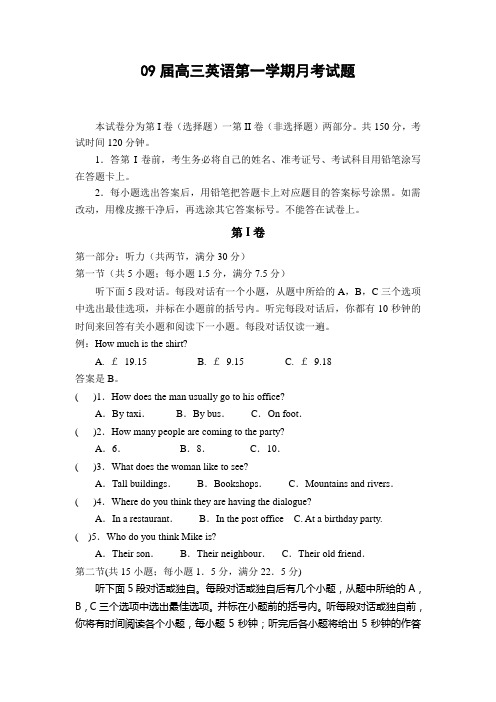
09届高三英语第一学期月考试题本试卷分为第I卷(选择题)一第II卷(非选择题)两部分。
共150分,考试时间120分钟。
1.答第I卷前,考生务必将自己的姓名、准考证号、考试科目用铅笔涂写在答题卡上。
2.每小题选出答案后,用铅笔把答题卡上对应题目的答案标号涂黑。
如需改动,用橡皮擦干净后,再选涂其它答案标号。
不能答在试卷上。
第I卷第一部分:听力(共两节,满分30分)第一节(共5小题;每小题1.5分,满分7.5分)听下面5段对话。
每段对话有一个小题,从题中所给的A,B,C三个选项中选出最佳选项,并标在小题前的括号内。
听完每段对话后,你都有10秒钟的时间来回答有关小题和阅读下一小题。
每段对话仅读一遍。
例:How much is the shirt?A. £19.15B. £9.15C. £9.18答案是B。
( )1.How does the man usually go to his office?A.By taxi.B.By bus.C.On foot.( )2.How many people are coming to the party?A.6.B.8.C.10.( )3.What does the woman like to see?A.Tall buildings.B.Bookshops.C.Mountains and rivers.( )4.Where do you think they are having the dialogue?A.In a restaurant.B.In the post office C. At a birthday party.( )5.Who do you think Mike is?A.Their son.B.Their neighbour.C.Their old friend.第二节(共15小题;每小题1.5分,满分22.5分)听下面5段对话或独自。
每段对话或独自后有几个小题,从题中所给的A,B,C三个选项中选出最佳选项。
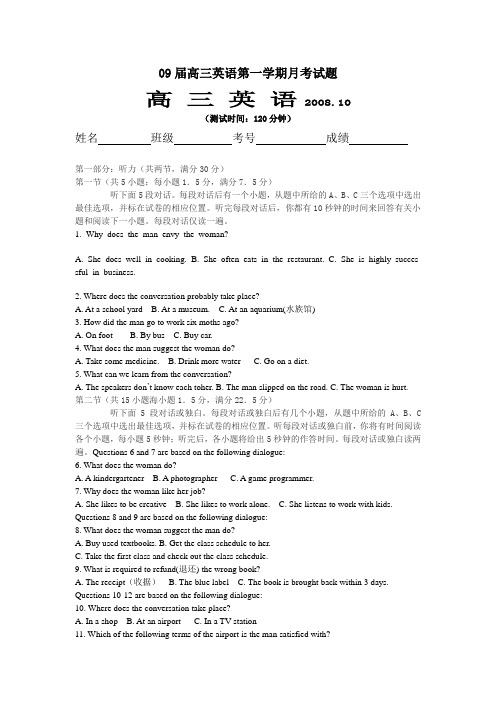
09届高三英语第一学期月考试题高三英语2008.10(测试时间:120分钟)姓名班级考号成绩第一部分:听力(共两节,满分30分)第一节(共5小题;每小题1.5分,满分7.5分)听下面5段对话。
每段对话后有一个小题,从题中所给的A、B、C三个选项中选出最佳选项,并标在试卷的相应位置。
听完每段对话后,你都有10秒钟的时间来回答有关小题和阅读下一小题。
每段对话仅读一遍。
1. Why does the man envy the woman?A. She does well in cooking.B. She often eats in the restaurant.C. She is highly succes sful in business.2. Where does the conversation probably take place?A. At a school yardB. At a museum.C. At an aquarium(水族馆)3. How did the man go to work six moths ago?A. On footB. By busC. Buy car.4. What does the man suggest the woman do?A. Take some medicine.B. Drink more waterC. Go on a diet.5. What can we learn from the conversation?A. The speakers don’t know each toher.B. The man slipped on the road.C. The woman is hurt.第二节(共15小题海小题1.5分,满分22.5分)听下面5段对话或独白。
每段对话或独白后有几个小题,从题中所给的A、B、C 三个选项中选出最佳选项,并标在试卷的相应位置。

09届高三年级英语第一次月考测试题英语试题一、单项选择(共15题,每题1分,共15分)1. Everywhere man has cut down forests in order to grow crops, or to usewood as fuel or as building material.A. the; theB. the;/C. /; theD. /;/2. The on her face told me that he was angry.A. impressionB. sightC. appearanceD. expression3. I hear boys in your school like playing football in their spare time, though othersprefer basketballA. quite a lotB. quite a fewC. quite a bitD. quite a little4. -He looks very hot and dry.-So if you had a temperature of 40℃.A. would youB. will youC. would have you beenD. do you5. When different cultures, we often pay attention only to the differences withoutnoticing the many similarities.A. comparedB. comparingC. being comparedD. having compared6. She Japanese when she was in Japan. Now she can speak it freely.A. picked outB. made outC. made upD. picked up7. -Where did you put the car keys?-On, I I put them on the chair because the phone rang as I in.A. remembered; comeB. remembered; was comingC. remember; comeD. remember; was coming8. If you are traveling the customs are really foreign to your own, please do as theRomans do.A. in whichB. whereC. whenD. what9. No sooner his talk than he the workersA. he finished; surrounded byB. did he finish; surrounded byC. had he finished; was surrounded byD. he had finished; was surrounded by10. Could it be in the living room he met the new teacher?A. whichB. whomC. thatD. where11. -Do you mind if I open the window?-I feel a bit cold.A. Of course not.B. I’d rather you didn’tC. Go ahead.D. Why not?12. -I can’t repair these until tomorrow, I’m afraid.-That’s OK, there’s .A. no problemB. no wonderC. no doubtD. no hurry13. Between the two generations, it is often not their age, their education that causesmisunderstanding.A. likeB. asC. orD. but14. -They are quiet, aren’t they?-Yes. They are accustomed at meals.A. to talkB. to not talkC. to talkingD. to not talking15. you eat the correct foods be able to keep fit and stay healthy.A. Only if ; will youB. Only if; you willC. Unless; will youD. Unless; you will二、完型填空(共20小题;每小题1分,满分20分)Not long ago, an incident that happened at Walt Disney touched me greatly. A guest __16__ out of our Polynesian Village resort at Walt Disney was asked how she __17__ her visit. She told the front-desk clerk she had had a(n)_18__ vacation, but was heartbroken about __19__ several rolls of Kodak color film she had not yet __20__. At that moment she was particularly __21_ over the loss of the pictures she had shot at our Polynesian Luau, _22_ this was a memory she especially treasured.Now, please understand that we have no written service rules __23_ lost photos in the park. __24_, the clerk at the front desk __25__ Disney's idea of caring for our __26__. She asked the woman to leave her a couple rolls of _27__ film, promising she would take care of the rest of our show at Polynesian Luau.Two weeks later the guest received a __28__ at her home. In it were photos of all the actors of our show, _29__ signed by each performer. There were also __30_ of the public procession and fireworks in the park, taken by the front-desk clerk in her own __31_ after work.I happened to know this __32_ because this guest wrote us a letter. She said that _33_ in her life had she received such good service from any business.Excellent __34_ does not come from policy handbooks. It comes from people who __35_ -and from a culture that encourages and models that attitude.16. A. working B. checking C. trying D. staying17. A. expected B. realized C. paid D. enjoyed18. A. disappointing B. wonderful C. uncomfortable D. important19. A. taking B. dropping C. losing D. breaking20. A. developed B. taken C. washed D. loaded21. A. silly B. nervous C. calm D. sad22. A. when B. where C. as D. which23. A. covering B. finding C. making D. keeping24. A. Excellently B. Fortunately C. Therefore D. Quietly25. A. understood B. reminded C. trusted D. discovered26. A. workers B. guests C. managers D. clerks27. A. printed B. shot C. unused D. recorded28. A. film B. card C. camera D. packet29. A. frequently B. personally C. alone D. actually30. A. rules B. pictures C. handbooks D. performances31. A. case B. work C. time D. position32. A. story B. place C. photo D. show33. A. only B. almost C. never D. nearly34. A. advice B. experience C. quality D. service35. A. care B. serve C. like D. know三、阅读理解(共15小题,30分)APeople enjoy talking about “firsts”. They like to remember their first love or their first car. But not all firsts are happy ones.One of history’s bad but important firsts was the first car accident. Cars were still young when it happened. The accident took place in New York City in May 1896. A man from Massachusetts was visiting the city in his new car. At that time, bicycle riders were still trying to get used to the new set of wheels on the road. No one was sure who was to blame for it. Anyway, the bike and the car hit each other hard. The man on the bike was injured. The driver of the car had to stay in jail and wait for the hospital report on the bicycle rider. Luckily the rider was not killed.Three years later, another car accident took place. It was again in New York City. A man named Henry Bliss stepped off a streetcar. He was hit by a passing car. Once again, no one was sure just how it happened or whose fault it was. The driver of the car was put in jail. Poor Mr. Bliss became the first person to die in a car accident.36. Which of the following is true?A. The first driver came from New York City.B. Both of the two car accidents killed a person.C. The second car accident didn’t happen in the same city as the first one.D. No one knew how the two accidents had happened.37. In both accidents the drivers of the cars .A. could not drive their cars very wellB. had to stay in jail for a whileC. tried to run away after the accidents took placeD. knew it was their fault38. The word“jail”in this passage means .A. police stationB. prisonC. schoolD. office39. The main idea of the passage is .A. not all firsts are happy onesB. two of the first car accidentsC. two unhappy“firsts”D. bicycle riders get used to carsBWhat do you hear? Sounds all around you! You can hear the sound of traffic, the wind in the trees, a dog barking, your own breathing and lots of other things.But what is sound? Sound happens when something vibrates(振动)or shakes. We can make something vibrate by hitting it. Try this experiment. Put your ruler on your desk so that part of it sticks out(伸出)over the edge. Put your hand on the part of the ruler that is on the desk. Now pull the part that is sticking out over the edge down, and then let it go. The part you let go will vibrate. It will move up and down very quickly, and give out sound.The part of the ruler sticking out over the edge of the desk produced the sound. If you make that part longer, you’ll hear a lower sound. When you shorten it, you will hear a higher sound. Why does this happen?When you shorten the ruler, it will vibrate more quickly. When something vibrates more quickly it produces a higher sound. If you lengthen the ruler, it will vibrate more slowly. When something vibrates more slowly, it produces a lower sound.40. How does sound happen?A. When something vibratesB. When something shakesC. When a ruler is put at the edge of the deskD. A and B41. We can hear a sound if we make the part of the ruler sticking out over the edge ofthe desk longer.A. higherB. lowerC. strongD. nice42. The word “lengthen” in the passage means ________.A. 加长B. 缩短C. 敲击D. 摇动43. The best title of the passage is_________A. An ExperimentB. A Way of Making SoundC. Sounds Are NoisyD. SoundsCSeveral years ago ,my parents ,my wife ,my son and I ate at one of those restaurants where the menu is written on a blackboard .After a wonderful dinner ,the waiter set the check in the middle of the table .That’s when it happened :my father did not reach for the check .Conversation continued .Finally I realized that I should pick up the check ! After hundreds of restaurant meals with my parents ,after a lifetime of thinking of my father as the one with dollars ,it had all changed .I reached for the check ,and my view of myself suddenly changed .I was an adult .I was no longer a kid.Some people mark off(区分)their lives in years ,I measure mine in small events .I didn’t become a young man at a particular age ,like 16 ,but rather when a kid who wandered in the streets called me“mister.”These events in my life are called“milestones”(里程碑).There have been other milestones .The cops (policemen)of my youth always seemedbig ,even huge ,and of course they were older than I was .Then one day they were suddenly neither .The day came when I suddenly realized that all the football players in the game I was watching were younger than I was .They were just big kids. With that milestone gone was the dream that someday ,maybe I, too, could be a football player. Without ever having reached the hill ,I was over it .I never thought that I would fall asleep in front of the TV set as my father did .Now it’s what I do best .I never thought that I would go to the beach and not swim ,yet I spent all of August at the shore and never once went into the ocean .I never thought that I would appreciate opera ,but now the combination of voice and orchestra(乐队)attract me .I never thought that I would prefer to stay home in the evenings, but now I find myself passing up parties .I used to think that people who watched birds were strange ,but this summer I found myself watching them ,and maybe I’ll get a book on the subject .I feel a strong desire for a religious belief that I never thought I’d want ,feel close to my ancestors (祖先)long gone ,and echo my father in arguments with my so n .I still lose …One day I bought a house .One day —what a day !—I became a father ,and not too long after that I picked up the check for my own father .I thought then it was a milestone for me .One day ,when I was a little older ,I realized it was one for him too ,another milestone .44. The tone established in the passage is one of .A. sad regretB. amusementC. happinessD. deep feeling45. “Then they were suddenly neither .”suggests that .A. suddenly they became older than I wasC. suddenly I knew that they were neither bigger nor older than I wasC. suddenly I realized that I made a mistakeD. suddenly I found myself no longer a kid46. Which of the following best expresses the author’s thinking ?A. One day is worth two tomorrows.B. To save time is to lengthen life.C. When an opportunity is lost ,it never comes back to you .D. Time and tide wait for no man .DAs the pace of life continues to increase, we are fast losing the art of relaxation. Once you are in the habit of rushing through life, being on the go from morning till night, it is hard to slow down. But relaxation is important for a healthy mind and body.Stress is a natural part of everyday life and there is no way to avoid it. In fact, it is not such a bad thing as it is often supposed to be. A certain amount of stress is vital(important)to provide motivation and give purpose to life. It is only when the stress gets out of control that it can lead to poor performance and ill health. The amount of stress a person can stand depends very much on the individual. Some people are not afraid of stress; others lose heart at the first sign of unusual difficulties. When faced with stress, in whatever form, we react both chemically and physically. In fact we make choice between“flight or fight ” and in moreprimitive(原始的)days the choices made the difference between life or death. The crises(危机)we meet today are unlikely to be so extreme, but however little the stress, it involves the same reaction. It is when such a reaction lasts long, through continued suffering from stress, that health becomes endangered. Since we cannot remove stress from our lives (it would be unwise to do so even if we could), we need to find ways to deal with it.47. People are finding less and less time for relaxing themselves because ______.A. they are traveling very oftenB. they believe that work is more important than relaxationC. they regard working as their greatest enjoymentD. they are becoming busier with their work than ever before48. According to the passage, the most important character of a good manager is .A. strong will to hold out stressB. having control over performanceC. high sense of responsibilityD. knowing the art of relaxation49. Which of the following statements is true according to the passage?A. It’s easy to change the habit of keeping oneself busy with work.B. Stress is always harmful to people’s health.C. We can find quite a few ways to avoid stress.D. Different people can bear different amount of stress.50. According to the passage, the right attitude towards stress is to .A. find some relaxationB. regard it as a vital motivationC. face it and overcome itD. avoid it四、任务型阅读(共10小题;每小题1分,满分10分)阅读下列短文,根据所读内容在文章后表格中的空格里填入最恰当的词。
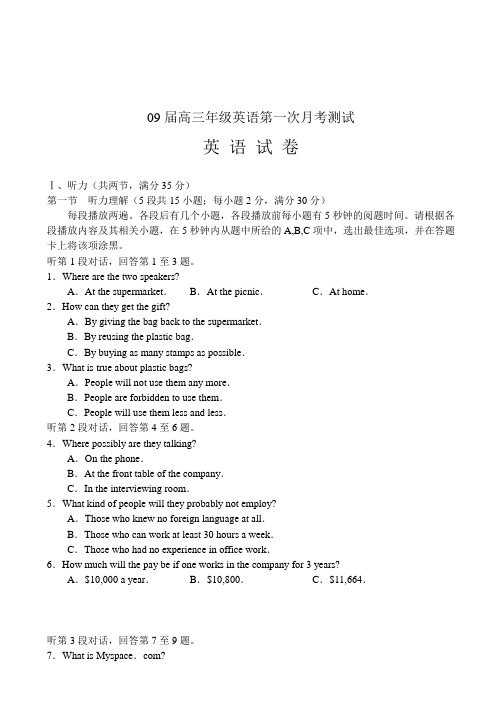
09届高三年级英语第一次月考测试英语试卷Ⅰ、听力(共两节,满分35分)第一节听力理解(5段共15小题;每小题2分,满分30分)每段播放两遍。
各段后有几个小题,各段播放前每小题有5秒钟的阅题时间。
请根据各段播放内容及其相关小题,在5秒钟内从题中所给的A,B,C项中,选出最佳选项,并在答题卡上将该项涂黑。
听第1段对话,回答第1至3题。
1.Where are the two speakers?A.At the supermarket.B.At the picnic.C.At home.2.How can they get the gift?A.By giving the bag back to the supermarket.B.By reusing the plastic bag.C.By buying as many stamps as possible.3.What is true about plastic bags?A.People will not use them any more.B.People are forbidden to use them.C.People will use them less and less.听第2段对话,回答第4至6题。
4.Where possibly are they talking?A.On the phone.B.At the front table of the company.C.In the interviewing room.5.What kind of people will they probably not employ?A.Those who knew no foreign language at all.B.Those who can work at least 30 hours a week.C.Those who had no experience in office work.6.How much will the pay be if one works in the company for 3 years?A.$10,000 a year.B.$10,800.C.$11,664.听第3段对话,回答第7至9题。

09届高三英语第一学期第一次月考试题(本试卷满分120分,考试时间120分钟)第一部分听力(共两节,满分20分)做题时,先将答案标在试卷上。
录音内容结束后,你将有两分钟的时间将试卷上的答案转涂到答题卡。
第一节(共5小题;每小题1分,满分5分)听下面5段对话。
每段对话后有一个小题,从题中所给的A、B、C三个选项中选出最佳选项,并标在试卷的相应位置。
听完每段对话后,你都有10秒钟的时间来回答有关小题和阅读下一小题。
每段对话仅读一遍。
1. When is Jhone supposed to arrive ?A. 7:30 a.mB.At 8:00 a.mC.At 8:15 a.m2. What does the woman suggest?A. getting help from AAA.B. Having a ride with herC. Changing3. Where are the speakers?A. At a restaurant.B.On a plane. C .At a waiting room4. What are speakers mainly about ?A. A hobby B . A plan C. Music5. Where does the man plan to go?A. To the libraryB.To a bookshopC.To the Sciene Buiding第二节(共15 小题;每小题1分,满分15分)听下面5段对话或独白。
每段对话或独白后有几个小题,从题中所给的A、B、C三个选项中选出最佳选项,并标在试卷的相应位置。
听完每段对话或独白前后,你将有时间阅读各个小题,每小题5秒钟;听完后,各小题将给出5秒钟的作答时间。
每段对话或独白读两遍。
请听第6段材料,回答第6至第7小题6. What does the man do ?A. He works in a famous hotel.B. He is a building designer.C. He is a teacher7. What might be a problem for the man?A. He has diffent opinions from his collegueB. He can’t do whatever he wants .C. He has trouble with his work请听第7段材料,回答第8至第10题8. Where did the woman go last night?A. A cinemaB. Rudolph’s placeC. An Italian restaurant9. What does the woman say about the atmosphere ?A. WonderfulB. AwfulC. A date10.What are the speakers mainly talking about ?A. A hobbyB. A planC. A date请听第8段材料,回答第11至13题11.When did the man say he arrived at Albert’s place ?A. At 11 p.mB. At about 12 at nightC. At 12:25a.m12.Where did man say he found Albert?A. In the swimming poorB. In the dinining roomC. At the door13.Who most probably is the woman ?A. A teacheerB. A reporterC.A policewoman请听第9段材料,回答第14至16题14.who is on an apple diet?A. The man’s sisterB. The man’s friendC. The man’s cousin15.What does the woman say about egg diet ?A. It does good to healthB. It does’nt help lose weightC. It does harm to heart16.what does the woman think of steak diet?A. It’s expensiveB. It does harm to teethC. It’s bad for heart请听第10段材料,回答第17至20题17. What does the speaker mainly talk about ?A. An experimentB. A workbookC. Equipment18. who is the speaker?A. A teacherB. A librarianC. A tour guide19. How are the activities different from experiment ?A. The activities take less timeB. No equipment is needed in activitiesC. Fewer instructions are given for activities20. When is the talk given ?A. At the biginning of the semesterB. After the first experimentC. At the end of the class第二部分:英语语言知识运用(共三节,满分35分)第一节:单项选择(共15 小题;每小题1分,满分15分)请认真阅读下面各题,从题中所给的A、B、C、D四个选项中,选出可以填入空白处的最佳选项,并在答题卡上将该项涂黑。

09届高三英语第一次月考试卷总分:150分时量:120分钟2008年9月24日命题人倪建军第一卷(三部分,共115分)第一部分 听力(共三节,满分 分)第一节(共 小题,每小题 分,满分 分)请听下面 段对话,每段对话后有一个小题,从题中所给的 、 、 三个选项中选出最佳选项,并标在试卷的相应位置。
听完每段对话后,你都有 秒钟的时间来回答有关小题和阅读下一小题,每段对话仅读一遍。
第二节(共 小题,每小题 分,满分 分)请听下面 段对话 每段对话后有几个小题 从题中所给的 、 、 三个选项中选出最佳选项,并标在试卷的相应位置。
听完每段对话后,你将有时间阅读各个小题,每小题 秒钟;听完后,各小题将给出 秒钟的作答时间,每段对话仅读两遍。
请听第 段材料,回答第 两个小题。
请听第 段材料,回答第 至第 四个小题。
请听第 段材料,回答 至第 三个小题。
请听第 段材料,回答 至第 三个小题。
第三节(共 小题,每小题 分,满分 分)请听下面一段材料,将第 至第 三个小题的信息补充完整。
每小题不超过三个单词。
听材料前,你将有时间阅读各个小题,每小题 秒钟,听完后,各小题将给出 秒钟的作答时间,本段材料读两遍。
第二部分:英语知识运用(共两节,满分 分)第一节:单项填空(共 小题;每小题 分,满分 分)从 、 、 、 四个选项中,选出可以填入空白处的最佳选项。
并在答题卡上将该项涂黑。
不填 不填 不填;不填第二节:完形填空(共 小题;每小题 分,满分 分)阅读下面短文 ,掌握其大意,然后从 各题所给的四个选项( 、 、 和 )中,选出最佳选项。
(年纪大的)养老金第三部分:阅读理解(共 小题,每小题 分,满分 分)第一节:阅读短文,选择答案。
(共 小题;每小题 分,满分 分)阅读下列短文,从每题所给的四个选项( 、 、 和 )中选出最佳选项。
(大一新生)藻类 (繁殖)(适合)补偿第二节(共 小题,每小题 分,满分 分)阅读下面短文,简要回答问题,并将答案转写到答题卡上回答词数不超过 个回答词数不超过 个第 卷(一部分,共 分)第四部分: 写作(共两节,满分 分)第一节 填空(共 小题,每小题 分,满分 分)阅读短文,根据所读内容在表中的空格处填上适当的单词或短语,每空不超过 个单词。
09届高三英语第一次联考月考试卷试卷总分:120分考试时间:120 分钟2008.09本试卷分为第Ⅰ卷(客观题)和第Ⅱ卷(主观题)两部分。
请将第Ⅰ卷答案涂在答题卡上,第Ⅱ卷答案写在答卷纸上。
第Ⅰ卷(客观题)共85分第一部分:听力(共两节,满分20分)第一节(共5小题;每小题1分,满分5分)听下面5段对话。
每段对话后有一个小题,从题中所给的A、B、C三个选项中选出最佳选项,并标在试卷的相应位置。
听完每段对话后,你都有10秒钟的时间来回答有关小题和阅读下一小题。
每段对话仅读一遍。
1. What is the man?A. A worker.B. A driver.C. A teacher.2. What is the man going to do this weekend?A. Meet a friend of his.B. Go to Beijing.C. Hold a birthday party.3. What did the woman buy her husband for Christmas?A. A book.B. A watch.C. A record.4. How does the woman feel?A. Surprised.B. Light-hearted.C. Worried.5. What does the man tell the woman?A. She is mistaken.B. His dog likes chasing cats.C. There is another cat that looks like hers.第二节(共15小题;每小题1分,满分15分)听下面5段对话或独白。
每段对话或独白后有几个小题,从题中所给的A、B、C三个选项中选出最佳选项,并标在试卷的相应位置。
听每段对话或独白前,你将有时间阅读各个小题,每小题5秒钟;听完后,各小题将给出5秒钟的作答时间。
每段对话或独白读两遍。
听第6段材料,回答第6至8题。
6. What is the woman going to do?A. Buy a birthday gift for David.B. Buy a pet for her husband.C. Buy some animals for the zoo.7. How many kinds of animals are mentioned in the conversation?A. 2.B. 3.C. 4.8. What can we learn from the conversation?A. The man likes keeping rabbits.B. The man built a zoo.C. The man doesn’t like snakes.听第7段材料,回答第9至11题。
9. How many goals did Jack’s team score?A. 3.B. 2.C. 1.10. What do we know about the woman?A. She watched the game on TV.B. She knew about the game over the radio.C. She watched the match at the stadium.11. When is Jack’s next match?A. On Friday this week.B. On Saturday this week.C. On Friday next week.听第8段材料,回答第12至14题。
12. What are the two speakers talking about?A. A flight timetable.B. Hiring a taxi.C. The way to Union Street.13. Where is the woman going on Saturday?A. Garden Hotel.B. The airport.C. The railway station.14. What time does the woman want to leave?A. At 7:00 am.B. At 7:00 pm.C. At 5:00 pm.听第9段材料,回答第15至17题。
15. Who is the man going to meet tomorrow?A. Dave.B. Tony.C. His girlfriend.16. What is the probable relationship between the two speakers?A. Husband and wife.B. Close friend.C. Boss and secretary.17. Where are the two speakers going to have dinner?A. In a restaurant.B. In the woman’s house.C. At the man’s home.听第10段材料,回答第18至20题。
18. What is the topic of this passage?A. China’s education.B. China’s history.C. China’s development.19. How many school-age children have dropped out of school?A. Over 2 million.B. Over 4 million.C. Over 12 million.20. What is the biggest problem in helping the poor children?A. Lacking love from society.B. Lacking money.C. Parents’ ignorance.第二部分英语知识运用(共两节,满分35分)第一节:单项填空(共15小题;每小题1分,满分15分)21. Bush said, “He extended__________ invitation to me, Laura and our family to come to _______ Olympics, and, of course, I was anxious to accept.”A. an, theB. the; /C. the; theD. an; /22. Cities have theaters, museums and big sporting events, but small towns have _____.A. nothingB. noneC. no oneD. little23. Communication along with information industry ______ an important part in modern times.A. playB. are playingC. have playedD. plays24. She devoted herself_________ to her research and it earned her a good reputation in her field.A. stronglyB. extremelyC. entirelyD. freely25. The milk is reported to have serious side effects and has been _____ from the market for further tests.A. withdrawnB. cancelledC. RenewedD. appointed26. He will never forget the day_________ the Chinese mountain-climbing team got to the top of Qomolanga forthe first time.A. whenB. whichC. whereD. that27. The order came________ the soldiers________ the small village the next morning.A. that; had to leaveB. that; should leaveC. /; must leaveD. when; should leave28. Written in a hurry, _____A. they found many mistakes in the reportB. Sam made lots of mistakes in the reportC. there are many mistakes in the reportD. the report is full of mistakes.29. Lin Miaoke, _________ in a red skirt, received thunderous applause from 90,000-plus audience at the “Bird’sNest”.A. WearingB. dressedC. putting onD. dressing30. We were all at a loss, wondering what was ________ this sudden change of plan.A. behindB. afterC. againstD. for31. My mother is always warning me when I go out, “Don’t get off the bus ____ it is stopping.”A. untilB. beforeC. whileD. after32. ---I’d rather have some wine, if you don’t mind.---_________. Don’t forget that you’ll drive.A. I’m sorry, but you’d better notB. Not at all, anything you wantC. Thank you all the sameD. Yea, never mind33. Don’t ____ until tomorrow what can be done today.A. put asideB. put offC. put upD. put down34. When an earthquake hit Sichuan Province, I was deeply touched by our government---she put people’s livesas the first_________.A. considerB. considerableC. accountD. consideration35. Seldom________ video games ever since they entered college.A. they have playedB. do they playC. did they playD. have they played第二节完形填空(共20小题;每小题1分,满分20分)阅读下面短文,掌握其大意,然后从第36至第55小题所给的A、B、C、D四个选项中,选出最佳选项。